Can Childhood Trauma Impact Your Personality Type?
When it comes to helping people with their personality type I’ve started to veer further and further away from the use of tests and indicators. This is mainly because there are so many factors that can impact how questions on indicators are answered. Environment, upbringing, trauma, mental illness, stress, looping, all these things can impact the result you get on a personality indicator or test.
One of my readers asked me several months ago to write an article about how childhood trauma might impact someone’s type result. I thought this was an excellent question, but I’ve needed time to ponder, research and talk to other typologists to see what they think.
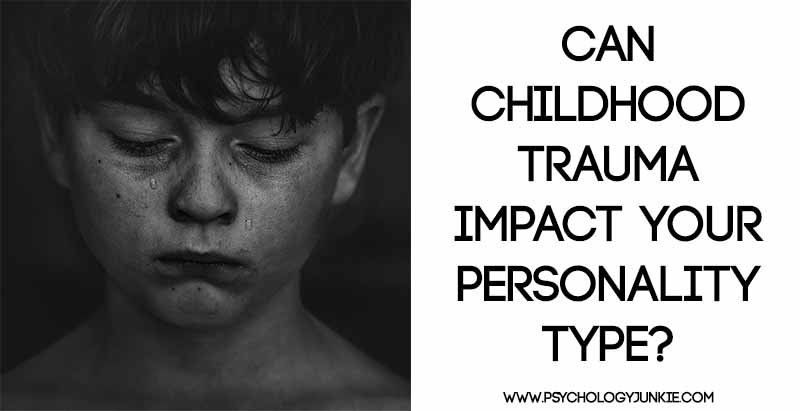
Not sure what your personality type is? Take our new personality questionnaire here. Or you can take the official MBTI® here.
Childhood Trauma Can Definitely Impact Your Personality Type Result
While childhood trauma won’t change your personality type, it can change the result you get on a type indicator (personality quiz, the official MBTI®, etc,.). One of the reasons this happens is that trauma can impact how you use, develop, and show your type preferences. Most tests and indicators look for “typical” type responses, behaviors, and reactions. They aren’t able to consider the effects of abuse, environment, and stress.
For example, an ENFJ who has grown up in an abusive, volatile environment and wasn’t nurtured through childhood may not be as socially conscious or in tune with the feelings of others as your typical ENFJ. Questions determined to root out healthy Extraverted Feeling (the dominant function of ENFJs) might fall flat for this kind of an ENFJ. Why? Well, studies in neuroscience have shown that children who aren’t nurtured or who are maltreated as children can experience a number of changes in their brain structure and chemical activity which will affect their behavior and social and emotional functioning.
“Toxic stress can alter brain development in ways that make interaction with others more difficult. Children or youth with toxic stress may find it more challenging to navigate social situations and adapt to changing social contexts (Hanson et al., 2010).” – Understanding the Effects of Maltreatment on Brain Development
An ENFJ who is recovering from a severely abusive or neglectful childhood might seem more withdrawn and introverted, and they might seem less aware or concerned with social constructs and the feelings of others. As a result, they could walk away from a personality test with a completely useless and inaccurate type result.
When it comes to personality typing, we can’t downplay the importance of neuroscience, background, environment and trauma. If I’m trying to type someone who is a child abuse survivor and who is struggling with PTSD I need to be ready for behavior and answers to questions that might be the result of coping mechanisms and not the result of their own inherent type.
My Own Experience
As a rape and abuse survivor who has been diagnosed with PTSD for most of my adolescence and adulthood, I know that stress, mental illness, and anxiety can have a major impact on how I display my own type. INFJs aren’t supposed to be especially drawn to past experience, but sometimes, because of PTSD, that experience pulls me back into its grasp. When I’m in the midst of anxiety and stress I can behave much more like an unhealthy ESTP than a healthy INFJ. Sometimes I lack the social grace and awareness that would be typical for an Extraverted Feeling type. During my darkest days I’ve lacked the visionary outlook on the future that is typical for Introverted Intuitive types. Does that mean I’m not an INFJ? No, but it does mean there have been times in my life where I certainly haven’t acted like your “typical” INFJ.
How Childhood Trauma Can Cause You to “Loop”
Sometimes when we become extremely defensive of ourselves or there’s a truth that we can’t accept (perhaps the truth that we were unloved or neglected) we can try to protect our psyche by entering a dominant-tertiary “loop”. This is where your dominant and tertiary functions loop back and forth, effectively bypassing your auxiliary function.
For example, an ESFP who has had their values violated through much of their childhood might try to suppress their auxiliary Introverted Feeling and loop back and forth between Extraverted Sensing and Extraverted Thinking. When this happens, this type is much more likely to get an ESTJ or an ENTJ result on a personality test.
In the same way, an ENTP who is stuck in a loop can cycle back and forth between Extraverted Intuition (Ne) and unhealthy Extraverted Feeling (Fe). This can make them seem more emotionally manipulative than a typical ENTP, and that tertiary Fe might give them a bent towards an “FJ” result in a personality test.
How Stress Can Impact Your Type Result
When you’re extremely stressed or depressed, you can get stuck “in the grip” of your inferior function. In most people, the inferior function is less conscious and less recognizable than the dominant or auxiliary function. But in people who are highly stressed or depressed, they might revert to using their inferior function more frequently. This can cause, as in my case, an INFJ to seem more like an unhealthy ESTP. It can cause an ENTJ to seem more like an unhealthy ISFP. You can find out more about how stress impacts your personality type here.
Children who have been abused or traumatized during their childhood are much more likely to experience stress, depression, or PTSD as adults. This can cause them to exhibit more “grip” behaviors than if they were in an emotionally healthy place. As an example, I’ve known several INFPs who tested as ESTJs because they were in a constant state of stress, anxiety and overwhelm.
How to Avoid Being Mistyped
– If you’re really wanting to take an indicator to define your type then try to answer the questions when you’re in a positive frame of mind.
– Take into account that the reason you may be hyper-vigilant, anxious, or on-edge might be related to stress and not your type. Think of behaviors and thought patterns that might be influencing you based on that. Read up on stress reactions and see if those might play a part in how you are expressing your type.
– Get familiar with the cognitive functions. If you read good descriptions of these and can determine which ones you favor in your happiest, most relaxed states, you’ll be less likely to mistype yourself.
– Talk to an MBTI® practitioner who is familiar with neuroscience and psychology who can give you a more multi-dimensional approach to finding your type!
What to Look For in the Future
I am going to be working on a series of posts about the different levels of health for each personality type. If you don’t relate to the “generic” type descriptions, you might find yourself able to identify with the types when they are described by their various health levels. So stay tuned!
What Are Your Thoughts?
Has your childhood had an impact on your personality type or your results? Share your thoughts with us in the comments!
Find out more about your personality type in our eBook, Discovering You: Unlocking the Power of Personality Type.
Other Articles You Might Enjoy:
The Learning Styles of Every Myers-Briggs® Personality Type
What Your Child Needs to Hear Based on Their Myers-Briggs® Personality Type
How Each Myers-Briggs® Type Can Feel Lonely (And What to Do About It!)
The Teenage Struggles of Every Myers-Briggs® Type
Get Your Free eBook!

Subscribe to our newsletter and get an eBook packed with powerful parenting tips for each personality type! Enjoy 28 beautifully illustrated pages exploring the needs and strengths of all 16 personality types in childhood.


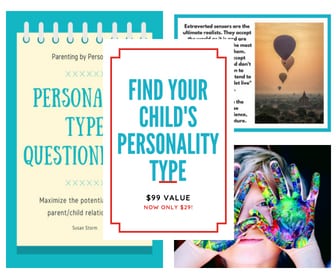
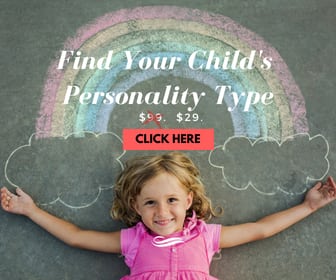

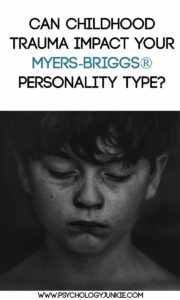
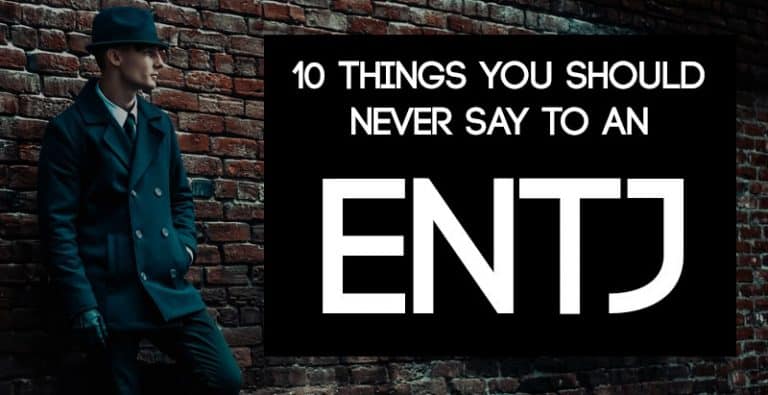
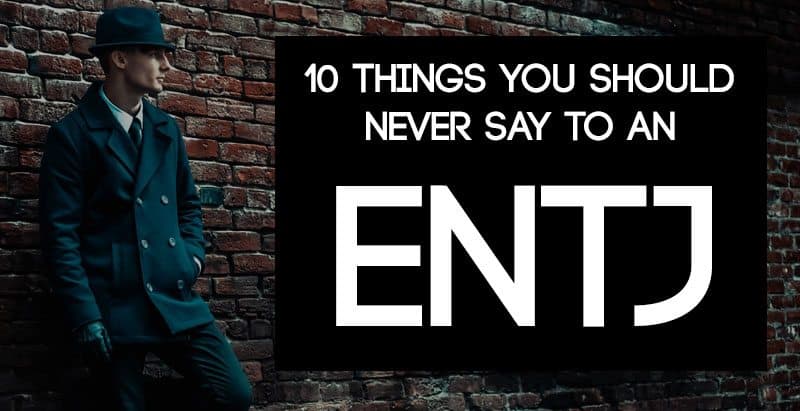


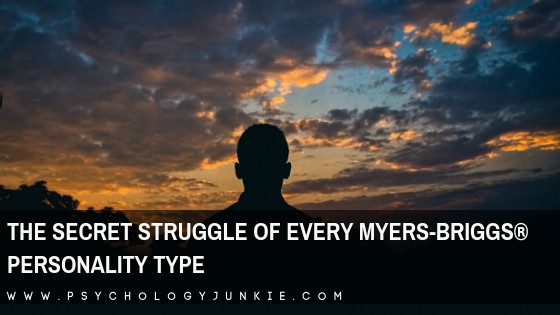


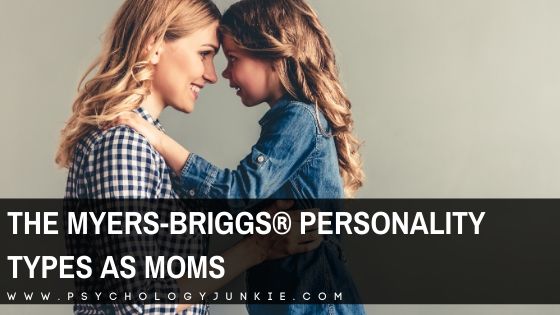


I don’t quite agree with this article, I am a domanent infp, have been through a lot of trauma and still score as an infp. I was diagnosed with two personality disorders, including bpd and PPD, ptzd and five anxiety disorders, and bipolar 2, I take those mental health problems more internally though and I don’t really act extroverted when I struggle I tend to keep those things in my mind. I also developed connective tissue diseases from PTSD, I have about six of them. According to health care professionals PTSD does cause connective tissue diseases in women. But I mean I’ve always been infp and i am still infp, pretty set in my ways too. I’m a kind girl though i have a lot of problems but I read an article from this site called the “unhealthy infp” I relate to that a lot. But i don’t believe that ppl will score the exact opposite on a test bc of trauma, it doesn’t make any sense to me at all. Everyone has their own opinions and I apologise if my message comes off as being kind of harsh.. that’s not how I want to come off. I just tend to trust articles intuitively so I tend to get a little upset when I read something that i can’t relate to and don’t agree with
From one INFP to another. I feel for you having so many “disorders”. Have you ever looked into a cleanse? You tube Dr. Morse grape fast. I’ve done it before and it always helps with my mental health. My problem is that I can’t ever stay on a cleanse long enough. Hope it helps you…
It doesn’t really make you more Extroverted however, it is more towards the functional stacks that affects your personality.
For example, a friendly and open minded INFP can become extremely defensive and insensitive like a unhealthy ESTJ.
I’m an INTJ who, due to childhood trauma, often mistypes as an “F.” I think this is because I’m more alert than the average INTJ to the social-emotional atmosphere around me. It was my protective mechanism as a kid (and maybe still today).
I’m an INTJ that always tests as 1-0% preference T>F, and I know I strengthed the hell out of my tertiary function when my parents divorced. The divorce didn’t affect my sister though because she’s 4 1/2
Years younger and didn’t really have memories of us as a family. I hadn’t realized at the time cuz i was just young boy, but It hurt so much I immediately went into a Ni-Fi loop with an unhealthy disposition towards my inferior Se…I’ve known about my loop even b4 I knew that that’s what it was called because I had to conquer it, but thanks to this article I was able to have an epiphany on the progress and development of my character…and thanks to you sharing your own experiences which correlate and share similarities with my own I was able to coalesce my vague intuitive understanding into a singular coherent personal truth…which I’m sure no doubt will lead me to deeper more profound understandings and insights of and into myself.
Truly and Honestly, thank you for this opportunity and especially for your patience if read all this ?
I was molested and raped by my father since baby days. My mother knew but saved her status and image in society. For years l adapted to the people around me to blend in and protect myself from hurt. Discovering myself, my likes and dislikes was quite a journey. I also started talking a LOT more. But too describe what happened, how it made me feel et. etc is so difficult. I can walk away from my family without a backward glance and live a wonderful live.
An interesting experiment has just occurred spontaneously in a very large Facebook complex trauma survivors group. We discovered that a vast majority of us have the rare INFJ personality type. I’d be fascinated to see an analysis of this phenomenon.
As childhood trauma survivor and PTSD sufferer, I used to score as an INFJ. Years later, I am doing much better, and I now score as an ENFP.
My first therapist saw me as an introvert, and one day, he suddenly changed his mind , realizing I was probably an inhibited extrovert. He apologized rather profusely for the mistake, which I found weird because it was the least of my concern at the time.
Re-reading both descriptions, I can honestly recognize “the healthiest me” in the ENFP portrait, although I am clearly not as joyful and adventurous as most ENFP seem to be. The “sad and insecure me” may have some of the INFJ traits, but others poorly fit. I am definitely not a calm and gentle person. I understand how I may appear this way when I am depressed, but this is not me. Also, I never enjoyed being alone. I often have to isolate myself because I am hurting too much to interact with others in a way I found satisfying. But being alone depresses me. I am quite good at reading people but I never felt especially drown to helping or protecting them. So far, I have mostly been invested in protecting myself from them. I recently realized I was genuinely curious about others, and I have always been fascinated by our diversity.
As I understand it, INFJ would be the ENFP’s shadow. Interesting fact… or maybe mere coincidence.
For now, I am still more acquainted with my INFJ-like self than my ENFP maybe-truer-self. And an important part of getting better now comes down to accepting my more outgoing traits without shame.
I took the Personality Hacker version of the MB a few days ago, and the result was INFJ. Reading through many of your posts here, talking about that type, I felt like I had just found myself, and was “home”. I’m not “weird”, I’m just rare. 🙂
That being said, I was molested by my step father when I was ten. I told a baby sitter, who told her mother, who called family services. Back in those days (early 70’s) they were just started to deal with that kind of thing, and so, they kicked him out of the house for three months and then let him come back (very long story). He lived with us another five years, although he never touched me again, he continued to be a very abusive and controlling. He insisted I take math and science classes every year (loved the science…math not so much). Strangely, he encouraged my love of books and reading. He brought home boxes of books from auctions, etc. for me. (I found out years later, after he died, that he was always telling people that I was really smart). That did not negate the damage his abuse caused.
I am a recovering alcoholic, ex smoker, and currently 85 lbs overweight. I was diagnosed with Bi Polar when I was 39. I have struggled through many abusive relationships.
I wonder if a knowledge of personality types and how each type deals with trauma would be useful in helping those people heal? I feel like I need to do something do blow the whistle on the prevalence of childhood sexual abuse and reach out to those already affected.
Hi Connie, I prayed for you. I’m so sorry that happened and hope you are doing ok today
You are so brave and strong Connie! And you have a BEAUTIFUL smile:)
What an interesting read! Love it!
I have had a problem between testing as infj/infp since I have gotten into the MBTI subject. I still am not quite sure even after I’ve read about the differences and how to tell between the two, because there are some things that I just don’t see in myself or relate to. This makes so much sense that coping mechanisms may be coming into play.
This may help explain the struggle to identify with one or the other, even after six months of trying to figure it out… maybe?!
My childhood trauma was contracting Lyme. I was left undiagnosed for 30 years. It has negative neurological effects. I was in pain all the time and severely depressed. I typed as ISFJ, then for years INFJ. Now I have been treated and have counseling, INFP.
Go figure.
Completely explains why I had been testing as ENTP for years even though I am an ENFP. Still working on connecting to my auxiliary Si and it feels like trying to make something usable out of fabric that has big holes in it, but I’ve got patience and love the challenge of it.
Thanks for the article and your transparency. Your willingness to share about your life helps others who read this gain understanding and not feel alone!
My past was rough, starting with childhood. I’ve been in therapy for 20+ years, but I really only started to make progress about 5 years ago. The more I have been/am able to accept who I am, the more my personality evolves. My type hasn’t drastically changed, but it did change, and I have definitely noticed other subtle differences. I used to score INFP every time, and the tests that showed percentages for how strongly I scored for each part always showed high scores for all four parts. As I heal, it changes. Now I score either INFP or INFJ, and both the introvert/extrovert and perceiving/judging are close the the middle. I notice this when I’m trying to answer the questions, too. I feel like my answers are almost exactly in the middle of many of the options.
I think “introvert” is correct for me, just not to the extreme I thought before. I’m really not sure about the perceiving/judging function. I might figure out which one fits better, but I might just be close to equal parts of both. I do identify with both the INFP and INFJ descriptions, sometimes others, too. I’m always able to relate to/understand other INFPs and INFJs, too. I can even predict when someone has one of those types quite often. Even with people I barely know, like therapists and people in support groups. Intuition is the one factor I don’t ever doubt.
I actually had a conversation with my therapist about (basically) this subject a few months ago. I told her I thought trauma related mental health issues could influence personality type. I had been noticing (in myself and others) how things like hypoarousal, coping mechanisms, low self esteem/confidence, and/or toxic shame, caused by maltreatment and/or abuse, can have a lot of influence on someone’s view of themselves. What they view as their feelings and preferences might actually be things they did in an effort to keep the peace and/or be not be rejected or hurt. I also think having ADHD, that wasn’t diagnosed until I was 42, makes it hard to answer some questions. For example: I tend to be messy, unorganized, and spontaneous, but want/try to be/feel more at peace when I’m organized and structured. It’s very hard to figure out which things are inherently me, which things are ADHD symptoms, and which are things I only prefer because they minimize symptoms and chaos.
I definitely think you’re right. I think a lot of people hold on so tightly to who they believe they are that they can’t see other possibilities, often because they believe it would be shameful to admit their perceptions had been influenced by other people and/or maltreatment.